News
Shettima Leads Tributes For Late Ezeife, Lauds Ex-Governor’s Visionary Leadership Says He Was A Man Of Exceptional Intellect, Pillar Of Nationhood
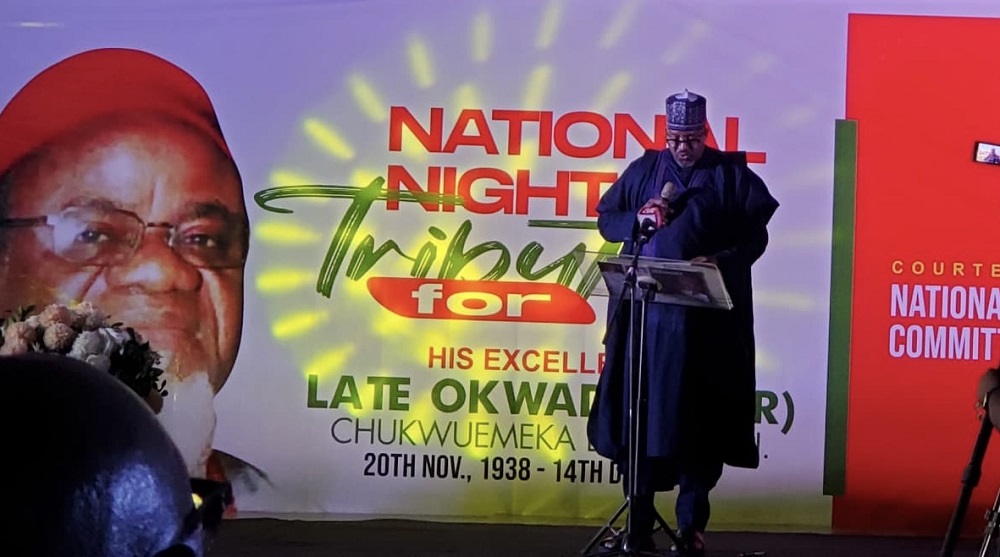
Vice President Kashim Shettima @officialSKSM led the nation in mourning of the late first civilian Governor of Anambra State, Dr. Chukwuemeka Ezeife, describing him as a visionary leader and a man of exceptional intellect.
In his solemn tribute during a National Night of Tribute held in honour of the late elder statesman at the grand arena of the ThisDay Dome in Abuja last night, VP Shettima in a statement issued by his spokesman, Stanley Nkwocha, hailed Dr. Ezeife as a “national colossus and a pillar of nationhood.”
Represented by Special Adviser to the President on General Duties (Office of The Vice President) and former Minister of the Federal Capital Territory, Dr Aliyu Modibbo Umar @alimodibbo, the Vice President commended Dr. Ezeife’s exceptional journey, highlighting his rise from someone with no formal secondary education to a Ph.D. holder in Economics from Harvard.
While eulogizing his statesmanship, Senator Shettima lauded Dr. Ezeife’s leadership qualities, both in the civil service and as Anambra’s first civilian governor.
He acknowledged Dr. Ezeife’s focus on long-term planning for sustainable growth, even if it meant prioritizing future development over immediate needs.
“Dr. Ezeife, fondly known as ‘Okwadike,’ was a true giant among men,” the Vice President said, even as he recognized his unwavering advocacy for the Igbo people.
The VP credited Dr. Ezeife with igniting a spirit of self-belief within the Igbo community and championing their development through political and socio-cultural efforts.
He also described the late elder statesman as a man of exceptional intellect and wit, known for his profound quotes and insightful analysis, saying “he was a mentor to many, and always willing to share his knowledge and inspire the next generation.”
Dr. Ezeife’s life, the Vice President noted, “was a testament to the power of resilience and an unwavering belief in the potential of our great nation,” adding that his legacy “will be a beacon of hope, guiding us through the challenges that lie ahead.”
Earlier, the Senate @NGRSenate President @SPNigeria, Godswill Akpabio @Senator_Akpabio, noted that it was with a sense of grief but dignity in his heart that he was paying tribute to Dr. Ezeife, a man he said has done so much for Nigeria.
“He was a chief advocate of a federal Nigeria to achieve unity and national cohesion. He advocated for effective governance at the grassroots,” Akpabio said.
Represented by his Chief of Staff, Sylvester Okonkwo @SylvesterSO23, the Senate President said Ezeife believed that constructive engagement and mutual respect were essential for national unity, stating that the late former Governor of Anambra State was a bridge builder.
“His ideas continue to influence decisions on how to structure Nigeria’s federal system. He prioritized education. We cannot forget him in a hurry. It is a personal loss. I send my condolences to his wife and members of his immediate family,” Akpabio added.
Dignitaries who also spoke at the National Night of Tributes included the Senator representing the Imo North Senatorial District, Chiwuba Patrick Ndubueze @NdubuezePatricC; Senator representing Imo West Senatorial District, Osita Bonaventure Izunaso @ositaBizunaso; the member representing Oshodi/Isolo Constituency II at the House of Representatives, Hon. Okey-Joe Onuakalusi, and member representing Njikoka/Dunukofia/Anaocha Federal Constituency, Hon Ozodinobi George Ibezimako.
Others were former Presidents of the Senate, Adolphus Wabara and Anyim Pius Anyim @AnyimPiusA; former Governors of Imo State, Achike Udenwa, Rochas Okorocha @realRochas and Emeka Ihedioha @EmekaIhedioha; former Governor of Ebonyi State, Dr. Sam Egwu; former Governor of Ogun State, Olusegun Osoba; a representative of the Deputy Speaker of the House of Representatives, Benjamin Kalu @OfficialBenKalu; a representative of Bishop Matthew Hassan Kukah of the Catholic Diocese of Sokoto, and former President/CEO of Transnational Corp of Nigeria, Valentine Ozigbo @valentineozigbo, among many others.
News
Diphtheria: Reps Direct Education Ministry Education To Strengthen Health, Safety Protocols In Unity Schools

News
SAD! Angry fan k!lls female influencer during live stream

Tokyo police are investigating the tragic killing of a 22-year-old female influencer who was fatally stabbed during a live stream on a public street.
The horrifying incident, which unfolded in real time, left viewers in shock as they witnessed the attack before the screen went dark.
According to local media reports on Wednesday, the suspect, a 42-year-old man believed to be a longtime follower of the influencer, was arrested at the scene. Investigators found multiple stab wounds on the victim’s body, including injuries to her head and neck.
Eyewitnesses reported that the influencer was engaging with her audience when she suddenly screamed for help. Moments later, sirens could be heard in the background as emergency responders arrived.
Preliminary investigations suggest that the suspect had been following the influencer’s content for years and may have deliberately tracked her movements based on details she shared about the live-stream. Authorities believe the attack was premeditated.
The suspect reportedly claimed that he had lent the influencer two million yen (approximately $13,450) but had not been repaid. Police are currently verifying his claims as part of the ongoing investigation.
Authorities are urging social media users to exercise caution regarding their online interactions and personal security.
News
Security operatives chase away thugs from PDP HQ amid leadership crisis
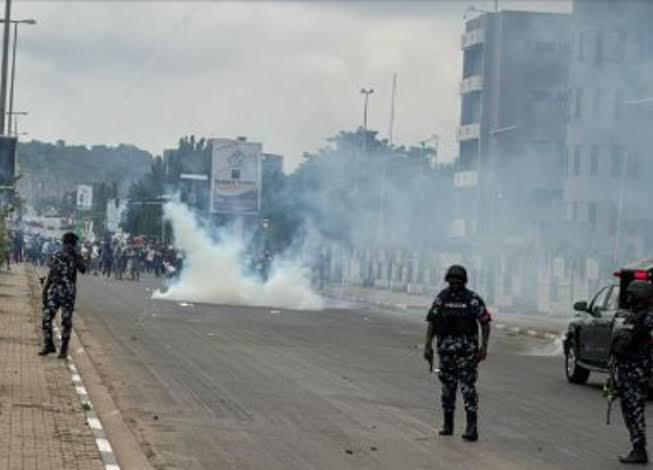
Operatives of the Police, Department of State Service, and Nigeria Civil Defence Corps, on Wednesday, cleared thugs from the Peoples Democratic Party’s headquarters in Abuja.
A party source, speaking on the condition of anonymity due to fear of victimisation, revealed to The PUNCH on Wednesday that the thugs were reportedly recruited to block members of the National Working Committee from entering the party headquarters for their meetings.
The crisis within the PDP has deeply affected all party organs, with recent developments seeing Samuel Anyanwu and former National Youth Leader Sunday Ude-Okoye both claiming the position of PDP National Secretary.
While the Court of Appeal in Enugu upheld Ude-Okoye as the National Secretary, Anyanwu took the matter to the Supreme Court.
As a result, the Supreme Court reserved its judgment on Monday, with the date to be communicated to the parties involved.
“The party staff, with the support of security personnel, confronted the thugs and dispersed them,” the source said.
At the party’s national headquarters, a reporter from The PUNCH noticed a heavy presence of security personnel.
Around six Nigeria Police, DSS, and NSCDC vans were stationed near Wadata Plaza, Wuse Zone 5, Abuja.
The Acting National Chairman, Umar Damagum, is currently leading the NWC meeting, with Ude-Okoye attending as the National Secretary.
Details shortly…
-

 News8 hours ago
News8 hours agoVideo: WATCH tearful Senator Natasha reporting Akpabio to IPU
-

 News21 hours ago
News21 hours agoNSITF vows prompt payment of compensation, presents cheque to National Assembly staff
-
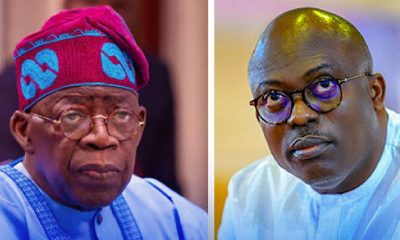
 News14 hours ago
News14 hours agoTinubu to Fubara: comply fully with S’Court verdict
-

 News23 hours ago
News23 hours ago‘We Gave You Enough Time,’ Wike Orders Residents To Evacuate From Right Of Way
-
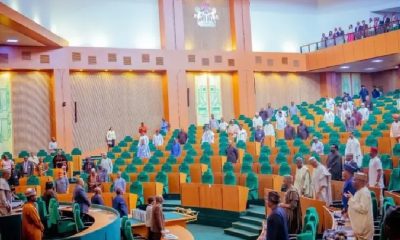
 News21 hours ago
News21 hours agoBill To Establish Federal College of Entrepreneurship Ntigha Pass Second Reading
-
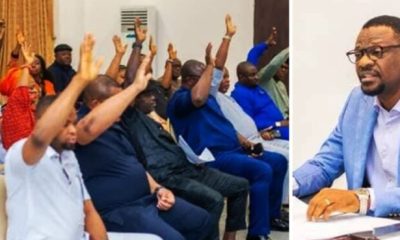
 News3 hours ago
News3 hours agoAuthentic Lawmakers Resume Sitting At Rivers Assembly After Shutting Out Governor Fubara From Presenting 2025 Budget
-

 News19 hours ago
News19 hours agoJust in: Tinubu meets with PANDEF leaders at Aso Rock
-

 News14 hours ago
News14 hours agoOdilli in trouble as Supreme Court gives EFCC the nod probe to ex-Gov






